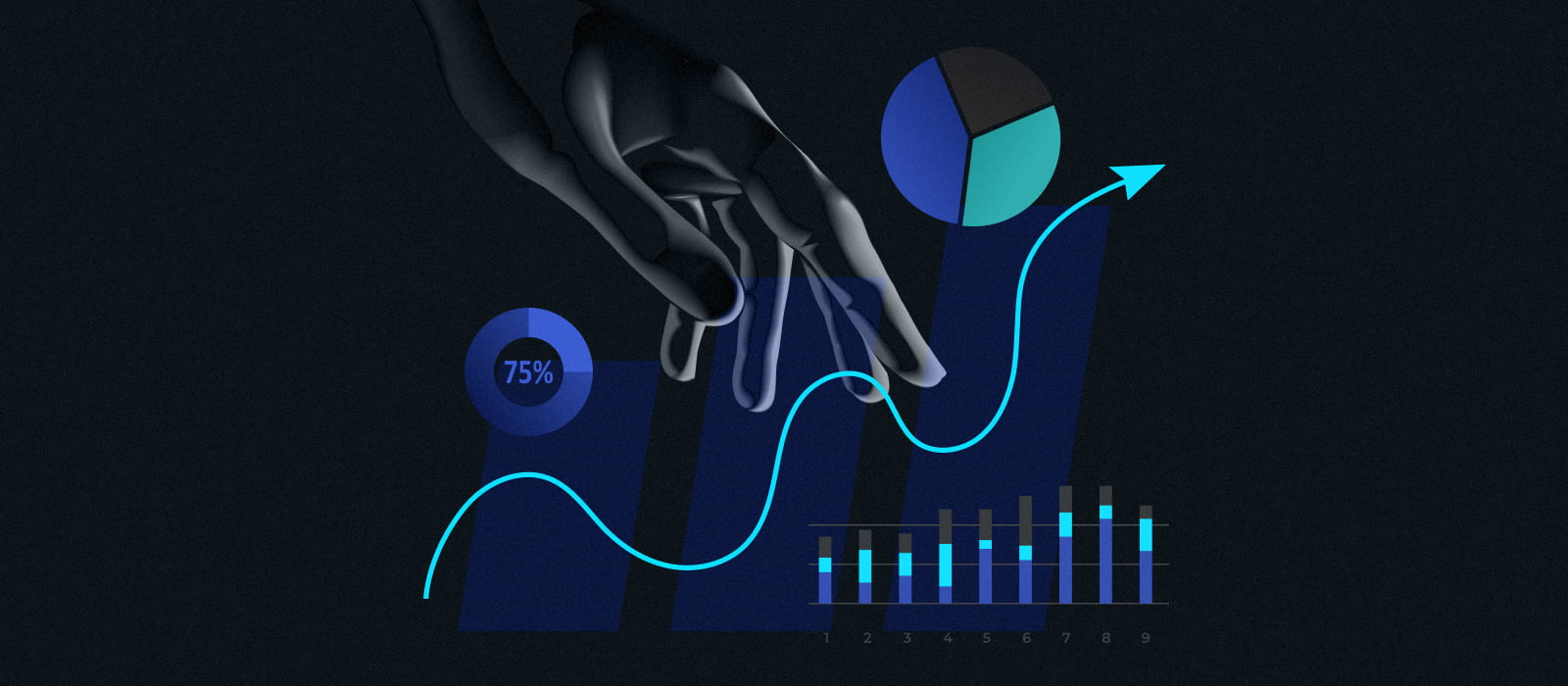Business intelligence empowers organizations to harness sophisticated insights to enhance their decision-making processes and understand their customers better — and as these benefits become even more vital, it is crucial to stay abreast of ever-evolving BI trends.
The global business intelligence market is burgeoning, with predictions suggesting that it will reach $41.94 billion by 2030.
For industry leaders, professionals, and stakeholders, implementing business intelligence in their workflows is crucial to maintaining a competitive edge, optimizing data-driven strategies, and fostering informed decision-making processes.
As we started 2025, the landscape is teeming with emerging trends and patterns, and these are not mere shifts — they are, in fact, foundational changes that are poised to reshape the business intelligence realm.
In this article, we will provide a detailed exploration of the top 15 business intelligence trends for 2025 and beyond and highlight their unique features and importance.
15 business intelligence trends to follow in 2025 and beyond
![]()
The top 15 essential business intelligence trends for 2025 encompass a broad range of areas and hold the potential to usher in significant changes for organizations that embrace them.
Let’s delve deeper into each of these business intelligence trends to understand their unique contributions.
1. Data governance
Data governance has risen in prominence within business intelligence due to its recognized value in organizations globally. It ensures responsible data management, builds trust with customers and stakeholders, validates data-driven decisions, and helps meet international security standards.
In response to the need for ethical and compliant data handling, modern BI tools now include features like automated data classification, audit trails, and real-time compliance monitoring. These not only reduce non-compliance risks but also safeguard against data misuse, emphasizing the necessity of integrating data governance with business intelligence in our digital age.
Dive into our comprehensive guide to the 15 best data governance practices and principles
2. Collaborative business intelligence
Collaborative business intelligence emphasizes the enhanced synergy between BI capabilities and various advanced technologies and platforms. This integration fosters more effective cooperation, leading to synchronized, rapid, and well-informed collaborative decisions.
By merging tools like online BI platforms and social media, the efficiency of data sharing and reporting is significantly heightened. This combination not only eliminates communication barriers but also cultivates a unified environment for insight sharing and analysis across diverse teams.
Moreover, the incorporation of real-time alerting systems within BI platforms ensures that teams receive immediate notifications about crucial data changes, thereby facilitating unified and timely action.
The addition of workflow automation further sharpens this approach by automatically triggering tasks or reports based on specific data conditions, thus eliminating the need for manual intervention. This comprehensive integration aids in enhancing the efficiency, speed, and accuracy of collaborative decisions within the business environment, which is why the collaborative business intelligence trend will be gaining traction in the years to come.
3. Self-service business intelligence
The emergence of self-service BI highlights a significant shift in the industry from a centralized data management system to a more distributed, agile, and informed approach, tailored to the dynamic needs of the 2025 business environment.
Organizations are increasingly focusing on equipping their personnel with sophisticated, yet user-friendly analytical tools. This move bypasses the conventional hurdles of IT dependency and paves the way for a democratization of data analytics. Consequently, users, irrespective of their technical expertise, can now effortlessly derive insights, visualize data, and craft detailed reports.
Key features driving this transformation encompass intuitive drag-and-drop interfaces, sleek dashboard layouts, and approachable guided analytics processes. These advancements ensure that even those without a deep technical background can engage with and benefit from powerful data analytics tools. However, if complex configurations are required, it is better to rely on data analytics services from reliable providers offering tailored solutions. These providers ensure that the setup is optimized for your specific needs, delivering efficient and effective data-driven insights.
Enhance your analytics approach with insights from our definitive article on self-service business intelligence
4. Augmented analytics
Augmented analytics, emerging as a pivotal business intelligence trend in 2025, is set to revolutionize data accessibility, precision, and depth of insights.
At its core, augmented analytics leverages the prowess of machine learning and artificial intelligence. This enables it to automatically process, sanitize, and classify data, converting raw datasets into actionable insights with limited human input.
What sets augmented analytics apart from conventional analytical methods is its inherent capability to independently unearth concealed patterns, trends, and insights within data sets. This autonomous approach empowers businesses to glean critical information effortlessly, negating the need for extensive data specialization.
Discover the latest data analytics trends shaping the business world
5. Data visualization
In the era where massive volumes of data are generated every day, the visual representation of this information has become indispensable. This drives the increasing emphasis on data visualization as a major business intelligence trend for 2025. Its inherent value lies in translating complex data sets into formats that are easily digestible, accessible, and actionable, all while providing personalized, captivating, and immersive user experiences.
Data visualization tools adeptly transform dense and intricate data into visually appealing charts, graphs, and other visual aids that align closely with the way humans process information. Cutting-edge visualization platforms such as Power BI and Tableau have evolved to feature real-time data refreshes, interactive dashboards, and multi-faceted analyses, addressing a broad spectrum of business requirements.
Combining the principles of aesthetic design with data science, these tools prioritize both clarity and user engagement. As a result, stakeholders at all organizational tiers — whether a top-tier executive, a middle manager, or a frontline staff member — can effortlessly assimilate crucial data insights without the tedious task of navigating through extensive spreadsheets or dense reports.
Explore PixelPlex's advanced data visualization services & consulting offerings and elevate your business intelligence to new heights
6. Mobile business intelligence
Mobile business intelligence emerges as a cornerstone in the BI landscape, reflecting the global transition towards more flexible, anytime-anywhere data engagement.
At its core, the mobile business intelligence trend is about designing sleek, user-centric mobile applications specifically crafted for optimal mobile usability, with a keen focus on intuitive navigation and rapid data access.
Modern mobile BI tools are taking innovation a step further. They now feature touch-optimized controls for ease of use on screens of all sizes, the ability to access data even when offline, and real-time alerts, ensuring timely updates. These enhancements cater seamlessly to a workforce that is becoming ever more mobile, emphasizing the need for swift, efficient, and effective data interaction in a fast-paced world.
Elevate your mobile business intelligence. Engage with our mobile app development services to harness the full potential of your data on-the-go
7. Data literacy
Data literacy is one of the latest trends in business intelligence. It entails understanding how to critically examine data, discern trends, and base decisions on informed analyses.
As we peered into 2025, data expertise is no longer the exclusive domain of data specialists. Whether you are anchoring roles in marketing, HR, or elsewhere, a sound understanding of data has become indispensable.
Recognizing its importance, companies are ramping up efforts to foster data literacy by rolling out training sessions, online courses, and workshops, aimed at enhancing the data skills of employees across all job roles.
Endorsing data literacy yields manifold benefits for organizations. When employees are versed in data interpretation, the quality of decision-making gets better, grounding choices in tangible insights rather than baseless speculations.
As well as this, as varied departments gain acumen in data interpretation, the outcome is heightened collaboration. Teams can articulate their insights more lucidly, mending any information disparities and fostering a harmonized approach to organizational objectives and strategies.
Such a holistic grasp of data not only augments operational efficiency but also propels organizations to the vanguard of innovation, ensuring they remain agile in a continuously evolving business environment.
8. Predictive analytics
Predictive analytics is emerging as a fundamental business intelligence trend and an indispensable ally in the corporate strategy arsenal.
This strong analytical method gives businesses a glimpse into the future and assists them in making solid predictions. As a result, by spotting potential market changes early on, companies can better plan their moves and navigate the ever-changing business world with confidence.
Additionally, predictive analytics offers a robust framework for risk management, as businesses can predict potential challenges and devise sturdy counter-strategies in advance.
Notably, in the customer-centric sphere, predictive analytics also offers a remarkable advantage. It equips organizations with the foresight to discern forthcoming consumer behaviors and inclinations, thereby laying the foundation for richer and more tailored customer interactions.
Unearth the potential of vast datasets. Dive deeper with our big data consulting offerings and set your business apart
9. Data storytelling
Data storytelling melds the complexity of data with the clarity of narrative, transforming dense data sets into engaging, understandable, and insightful tales.
Internally, data storytelling ignites curiosity, increasing engagement and aligning employees with the firm’s mission. It enables them to look beyond mere figures, creating a deeper resonance with the company’s primary objectives.
Externally, presenting these data narratives uplifts the brand’s reputation. It reflects a company’s commitment to extracting meaningful insights rather than merely skimming data’s surface
10. Data quality management
Data quality management (DQM) stands out as another notable trend in business intelligence. It is responsible for enhancing the precision and trustworthiness of data that powers BI systems.
Through rigorous standardization, DQM ensures that every piece of data provides uniform and consistent insights into daily business operations. Integrating DQM into business intelligence processes strengthens data governance frameworks and heightens operational transparency.
As a result, business leaders receive consistent, accurate information, empowering them to guide the business with both confidence and clarity.
11. Embedded analytics
Embedded analytics is steadily evolving into an indispensable component of forward-looking business intelligence applications.
Beyond its essential function, it represents a significant enhancement in user experience, fostering the ability to make immediate, data-driven decisions precisely at the point of action. This seamless integration into daily workflows empowers organizations to uncover fresh opportunities and guarantees that critical insights are accessible precisely when they are most needed.
On top of this, embedded analytics in BI solutions significantly shortens the time gap between data generation and the ability to derive actionable insights, thus offering a considerable boost to operational efficiency.
Check out our article on embedded finance and discover the future of seamless financial transactions within platforms
12. AI-driven development
The integration of artificial intelligence and business intelligence marks a significant milestone in contemporary business practices, where data-driven insights serve as an important aspect for shaping strategic planning and execution.
Through the strategic deployment of AI capabilities, BI platforms demonstrate an exceptional capacity for continual adaptation and data absorption. Employing advanced machine learning algorithms, these platforms continually enhance their analytical precision, displaying an increasingly refined ability to extract valuable patterns and trends from vast and complex datasets.
Consequently, this approach empowers all stakeholders to make proactive and well-informed decisions. Additionally, it strengthens an organization’s resilience and agility, equipping it with the ability to swiftly adapt and thrive amidst the continually shifting landscape of rapidly evolving business dynamics.
Need a reliable and experienced AI development partner? Let’s get acquainted
13. Data security
Given the escalating sophistication of cybersecurity attacks, fortifying business intelligence systems and solutions with robust security measures becomes imperative to ensure the confidentiality and integrity of pivotal business information.
The implementation of cutting-edge security features within business intelligence platforms, such as threat detection algorithms, behavior analytics, and automated security patch management, not only thwarts unauthorized access but also significantly enhances the overall trust and reliability placed in these essential tools.
14. Blockchain-driven development
Blockchain can be used in business intelligence by providing a secure and tamper-proof ledger for storing and sharing critical data, ensuring data integrity and trustworthiness. The technology also enables transparent and decentralized data sharing among multiple parties, thus significantly boosting collaboration and data accuracy in business intelligence processes.
With these advantages, blockchain emerges as a transformative tool for businesses seeking to harness the full potential of their data in the realm of business intelligence.
See how our professional blockchain development services can bring innovation and enhance the operational efficiency of your enterprise
15. Natural language processing
Natural language processing (NLP) stands out as a prominent business intelligence trend. It harnesses the power of language analytics to enable systems to understand and generate human language in context.
With the integration of NLP into business intelligence tools, users gain the ability to interact directly with databases using plain language, which eliminates the need for complex query languages and extensive data expertise. This not only broadens data accessibility across organizations but also empowers a wider range of individuals to extract valuable insights.
Notably, the incorporation of NLP into business intelligence enhances platforms with advanced features such as sentiment analysis and topic modeling, thus enabling deeper insights to be extracted from unstructured textual data.
Delve into the intricacies of enterprise business intelligence and master its implementation with our definitive guide
Closing thoughts
Peering into the horizon of 2025 and beyond, the realm of business intelligence is evolving at an unprecedented pace. The top 15 BI trends outlined in this article not only underscore the transformative power of BI but also promise to fuel innovation across industries.
As we delve further into the era of data-driven decision-making, ensuring your business remains at the forefront of these trends becomes paramount.
PixelPlex offers cutting-edge business intelligence services tailored to propel your enterprise to new heights, ensuring you not only keep pace with emerging trends but also lead the way.
Act now, and harness the expertise of our PixelPlex team. Let’s work together to achieve new milestones for your business.




